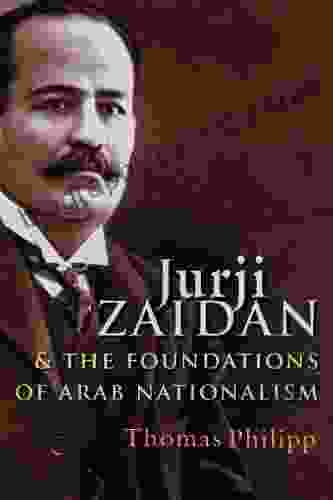Jurji Zaidan and the Foundations of Arab Nationalism: Modern Intellectual and Political Thought in the Middle East

Jurji Zaidan was a Lebanese-Egyptian writer, journalist, and historian who is widely considered to be one of the founders of Arab nationalism. He was born in Beirut in 1861 and died in Cairo in 1914. Zaidan's work had a profound impact on the development of Arab nationalism, and he is still revered as a major figure in the Arab world today.
5 out of 5
| Language | : | English |
| File size | : | 3917 KB |
| Text-to-Speech | : | Enabled |
| Screen Reader | : | Supported |
| Enhanced typesetting | : | Enabled |
| Print length | : | 478 pages |
Zaidan's early life was marked by poverty and hardship. He was the son of a Maronite Christian father and a Muslim mother. His father died when he was young, and his mother was forced to support the family by working as a seamstress. Zaidan attended a Maronite school, where he excelled in his studies. He later studied at the American University of Beirut, where he was exposed to Western ideas and culture.
In 1880, Zaidan moved to Cairo, where he began his career as a journalist. He soon became a leading figure in the Arab nationalist movement. Zaidan's writings were widely read and influential, and he helped to shape the political and intellectual landscape of the Arab world.
Zaidan's vision of Arab nationalism was based on a belief in the unity of the Arab people and the need for a unified Arab state. He argued that the Arabs were a distinct nation with a shared history, culture, and language. He also believed that the Arabs had a right to self-determination and that they should be free from foreign rule.
Zaidan's ideas were not universally accepted. Some Arabs were skeptical of his vision of a unified Arab state, and others were concerned about the potential for conflict between Arabs and other groups in the Middle East. However, Zaidan's ideas played a major role in the development of Arab nationalism, and he is still revered as a major figure in the Arab world today.
Zaidan's Life and Work
Zaidan was born in Beirut, Lebanon, in 1861. His father was a Maronite Christian and his mother was a Muslim. Zaidan's father died when he was young, and his mother was forced to support the family by working as a seamstress. Zaidan attended a Maronite school, where he excelled in his studies. He later studied at the American University of Beirut, where he was exposed to Western ideas and culture.
In 1880, Zaidan moved to Cairo, where he began his career as a journalist. He soon became a leading figure in the Arab nationalist movement. Zaidan's writings were widely read and influential, and he helped to shape the political and intellectual landscape of the Arab world.
Zaidan's vision of Arab nationalism was based on a belief in the unity of the Arab people and the need for a unified Arab state. He argued that the Arabs were a distinct nation with a shared history, culture, and language. He also believed that the Arabs had a right to self-determination and that they should be free from foreign rule.
Zaidan's ideas were not universally accepted. Some Arabs were skeptical of his vision of a unified Arab state, and others were concerned about the potential for conflict between Arabs and other groups in the Middle East. However, Zaidan's ideas played a major role in the development of Arab nationalism, and he is still revered as a major figure in the Arab world today.
Zaidan was a prolific writer. He published over 200 books and articles on a wide range of topics, including history, politics, literature, and religion. His most famous work is his 19-volume history of the Arabs, which is still considered to be one of the most authoritative works on the subject.
Zaidan also founded several newspapers and magazines, which played a major role in the spread of Arab nationalist ideas. His most famous newspaper was Al-Hilal, which was published in Cairo from 1892 to 1914. Al-Hilal was one of the most widely read newspapers in the Arab world, and it played a major role in shaping the political and intellectual landscape of the region.
Zaidan died in Cairo in 1914 at the age of 53. He is buried in the Al-Azhar Mosque in Cairo. Zaidan's legacy continues to live on today. He is still revered as a major figure in the Arab world, and his writings continue to be read and studied by scholars and students of Arab history and politics.
Zaidan's Legacy
Zaidan's legacy is complex and multifaceted. He was a pioneer of Arab nationalism, and his writings played a major role in the development of the Arab nationalist movement. He was also a prolific writer and journalist, and his work had a profound impact on the political and intellectual landscape of the Arab world.
Zaidan's vision of Arab nationalism was based on a belief in the unity of the Arab people and the need for a unified Arab state. This vision was not universally accepted, and some Arabs were concerned about the potential for conflict between Arabs and other groups in the Middle East. However, Zaidan's ideas played a major role in the development of Arab nationalism, and he is still revered as a major figure in the Arab world today.
Zaidan was a complex and controversial figure. He was a brilliant writer and thinker, but he was also a man of his time. Some of his writings contain racist and anti-Semitic remarks, which reflect the prevailing attitudes of the time. However, Zaidan's overall legacy is positive. He was a pioneer of Arab nationalism, and his writings played a major role in the development of the Arab nationalist movement. He was also a prolific writer and journalist, and his work had a profound impact on the political and intellectual landscape of the Arab world.
Jurji Zaidan was a major figure in the history of Arab nationalism. His writings played a major role in the development of the Arab nationalist movement, and he is still revered as a major figure in the Arab world today. Zaidan's legacy is complex and multifaceted, but his overall contribution to the Arab world is undeniable.
5 out of 5
| Language | : | English |
| File size | : | 3917 KB |
| Text-to-Speech | : | Enabled |
| Screen Reader | : | Supported |
| Enhanced typesetting | : | Enabled |
| Print length | : | 478 pages |
Do you want to contribute by writing guest posts on this blog?
Please contact us and send us a resume of previous articles that you have written.
 Book
Book Novel
Novel Page
Page Chapter
Chapter Text
Text Story
Story Genre
Genre Reader
Reader Library
Library Paperback
Paperback E-book
E-book Magazine
Magazine Newspaper
Newspaper Paragraph
Paragraph Sentence
Sentence Bookmark
Bookmark Shelf
Shelf Glossary
Glossary Bibliography
Bibliography Foreword
Foreword Preface
Preface Synopsis
Synopsis Annotation
Annotation Footnote
Footnote Manuscript
Manuscript Scroll
Scroll Codex
Codex Tome
Tome Bestseller
Bestseller Classics
Classics Library card
Library card Narrative
Narrative Biography
Biography Autobiography
Autobiography Memoir
Memoir Reference
Reference Encyclopedia
Encyclopedia Arnette Heidcamp
Arnette Heidcamp Anna Mcnuff
Anna Mcnuff Gilly Macmillan
Gilly Macmillan Neil Fontaine
Neil Fontaine Ann Hood
Ann Hood Schuld
Schuld Ann Petry
Ann Petry Martine Chemana
Martine Chemana Arina Tanemura
Arina Tanemura Thomas M Hill
Thomas M Hill Nancy Mather
Nancy Mather Arne Perras
Arne Perras Jake Byrne
Jake Byrne Anne De Courcy
Anne De Courcy Annie Bellet
Annie Bellet Beverly Serrell
Beverly Serrell Annette Gisby
Annette Gisby Anthony Amos Ii
Anthony Amos Ii Arlene Pellicane
Arlene Pellicane Antonia Fraser
Antonia Fraser
Light bulbAdvertise smarter! Our strategic ad space ensures maximum exposure. Reserve your spot today!

 Gilbert CoxUnlock the Secrets to an Eight-Figure Online Business: A Comprehensive Review...
Gilbert CoxUnlock the Secrets to an Eight-Figure Online Business: A Comprehensive Review...
 Billy PetersonDiscover How to Negotiate Like a Pro: Become a Negotiation Master with How to...
Billy PetersonDiscover How to Negotiate Like a Pro: Become a Negotiation Master with How to... Fred FosterFollow ·17.9k
Fred FosterFollow ·17.9k Neil GaimanFollow ·4.2k
Neil GaimanFollow ·4.2k Jackson BlairFollow ·17.4k
Jackson BlairFollow ·17.4k Dan BellFollow ·8.2k
Dan BellFollow ·8.2k John GrishamFollow ·5.8k
John GrishamFollow ·5.8k Brett SimmonsFollow ·19.6k
Brett SimmonsFollow ·19.6k Billy FosterFollow ·13.8k
Billy FosterFollow ·13.8k Hassan CoxFollow ·10.4k
Hassan CoxFollow ·10.4k

 Juan Rulfo
Juan RulfoThe Easy Ingredient Ketogenic Diet Cookbook: Your...
Embark on a culinary adventure that...

 Zachary Cox
Zachary CoxDepression Hates a Moving Target: A Groundbreaking...
Depression...

 Colin Richardson
Colin RichardsonUnleash Your Spine-Tingling Curiosity: Dive into the...
In the realm of...

 Evan Hayes
Evan HayesMarketing Fashion Portfolio: The Ultimate Guide to...
In the competitive world of fashion, it is...
5 out of 5
| Language | : | English |
| File size | : | 3917 KB |
| Text-to-Speech | : | Enabled |
| Screen Reader | : | Supported |
| Enhanced typesetting | : | Enabled |
| Print length | : | 478 pages |











